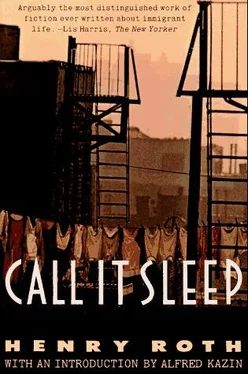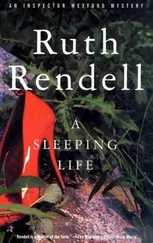“In Tysmenicz,” he scowled sourly as he settled into a chair, “the peasant who tended my—” (There was always that hitch in his speech before the word) “my father’s cattle used to say that a man had to be born a fool to be one. My friend Luter should come on his second childhood early in years — God’s given him a new soul.” He pulled the plate toward him with abrupt impatience. “All I hope is he doesn’t blame my married happiness for his marriage!” He uttered the last words with a peculiar challenging emphasis.
David who was watching his mother as she stood above her husband serving him, saw her bosom swell up slowly as though responding to minute increments of pain, and then without response, exhale tautly her muted breath and look off blankly and resigned. David himself knew only one thing — that the relief Luter’s absence afforded him was as sharp and fervent as a prayer, and that every wordless nerve begged never to see the man again.
At bed-time, his mind seemed strangely calm, reposed without being resolved, inert after long discord. Beneath the film of apathy, the events of yesterday ruffled the surface only rarely, like the tardy infrequent wreckage of a ship long sunken. They would never be answered these questions of why his mother had let Luter do what Annie had tried to do; why she hadn’t run away the second time as she had the first; why she hadn’t told his father; or had she; or didn’t he care. Nor would there ever be the equilibrium again between his knowing what she had done and her unawareness that he knew; her unawareness of what he had done with Annie, of why he had run away; his father’s unawareness of every thing. They would never be solved, never be answered. No one would say anything, no one dared, no one could. Just don’t believe, don’t believe, never. But when would that queer weight, that odd something lodged in his bosom, that was so spiny, ramified, reminding, when would that vanish? Tomorrow, maybe? Maybe tomorrow.
Tomorrow came. Monday. The cold of the day before had either been imaginary or been thrown off. David was sent to school. Once out of the house, he walked guardedly, even taking a new route to avoid meeting Annie or Yussie. In the morning, he succeeded and again at noon, but when school was out for the day, they ran into him as he came out into the open of the crossing. David, himself, shrank away when they hailed him, but they on the other hand seemed to have forgotten all hostilities. Instead they were merely curious.
“W’od id ’ey do t’yuh in de polliss station?” Yussie engaged his arm to keep him in step with the slower limping Annie.
“Nutt’n’!” He shook him off sullenly. “Lemme go!”
“Hey, yuh mad?” Yussie looked surprised.
“Yea, I’m mad! I’ll never get glad!”
“He’s mad, Annie!”
“Nisht gefiddled!” she said spitefully. “Pooh! Who wants yuh!”
“Cry baby!” said Yussie disdainfully.
But David was already hurrying off.
At home, he could not help but observe in his mother’s actions a concealed nervousness, an irresolution as if under the strain of waiting. Unlike the fluent, methodical way in which she habitually moved about the kitchen, her manner now was disjointed, uncertain. In the midst of doing something or of saying something, she would suddenly utter a curious, suppressed exclamation like a sudden groan of dismay, or lift her hand in an obscure and hopeless gesture, or open her eyes as though staring at perplexity and brush back her hair. Everything she did seemed insecure and unfinished. She went from the sink to the window and left the water running and then remembering it was an odd overhastiness, turned, missed the handkerchief she was pegging to the clothesline and let it fall into the yard. A few minutes later, separating the yolks from the whites of the eggs to make the thick yellow pancakes that were to go with the soup, she cut the film of the yolk with eggshell, lost it in the whites. She stamped her foot, chirped with annoyance and brushed back her hair.
“I’m like my father,” she exclaimed suddenly. “Vexation makes my scalp itch! Today you can learn what kind of a woman not to marry.”
Several times during the afternoon, David had been on the point of asking her whether Luter were coming for supper. But something always checked him and he never formed the question.
To avoid the strange emotion, that his mother’s behavior aroused in him, he would have gone downstairs again, even at the risk of encountering Annie or Yussie, but there again, he divined how impatient she would be if he asked her to wait in the hallway. She had seemed cross when he called to her frantically after his meeting with them at three. As she offered no objections he remained indoors and occupied himself in a score of ways — now frightening himself by making faces at the pier glass, now staring out of the window, now fingering the haze of breath upon it, now crawling under beds, now scribbling. He spent an hour tying himself to the bed post with a bit of washline and attempting to escape, and another constructing strange devices with his trinkets. He tried to play the four-handed game of manipulating patterns out of a double string with two hands and the leg of a chair. It was difficult, the old patterns slipped before they were clinched, ended in a snarl. The mind too was tangled, apprehensive, pent-up.
Meanwhile he had observed that his mother’s nervousness was increasing. She seemed neither able to divert her mind nor complete any task other than was absolutely necessary. She had begun to sew the new linen she had bought to make pillow-cases with and had ended by ripping out the thread and throwing the cloth back into the drawer with a harassed cry. “God knows why I can’t make these stitches any shorter! Six to a yard almost! They’d have parted with a shroud’s wear!” And then later, gave up the attempt to thread a cupful of large red beads and dropped them into the cup again and shut her eyes. The newspaper received only a worried glance and was folded up again and dropped in her lap. After which, she sat for such a long time staring at him, that David’s uneasiness grew intolerable. His eyes fluttered hurriedly about the room, searching for something that might distract the fixity of that stare. And grazing the coal sack beside the stove, the seams of the ceiling, the passover dishes on top of the china closet, sink legs, garbage pail, doorhinges, chandelier, lighted on the mantle burning with its soft, bluish flame.
“Mama!” He made no attempt to conceal the anxiety in his voice.
Her lids flickered. She who was always near him in spirit, now seemed hardly aware. “What?”
“Why does that light — that light in the mantle stay inside? In the mantle?”
She looked up, combed her upper lip with her teeth a moment. “That’s because there are great brains in the world.”
“But it breaks all up,” he urged her attention closer. “All up if you — if you even just blow.”
“Yes.”
“It doesn’t burn even when you light it?”
“No.” The dull remote tone never left her voice — as if speech were mechanical, forced.
“Why?” He demanded desperately. “Why doesn’t it?”
“Doesn’t what? I don’t know.” She rose, shivered suddenly. “As though it pierced the marrow! Is it cold in here? Or where I sit? Chill?” And stared at the stove, then followed her gaze after a long pause as if her very thought were delayed, and picked up the poker.
“I don’t feel cold.” David reminded her sullenly.
But she hadn’t heard him. Instead her eyes had swerved from his face to the wall and she stood as if listening beyond him, as if she had heard a sound in the hallway outside. No one. She shook her head. And still with the poker in one hand, lifted the other to adjust the gas-cock under the mantle-light—
Читать дальше












